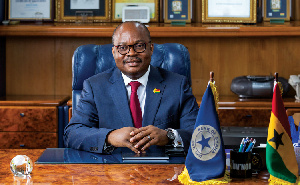 Bank of Ghana Governor, Dr Ernest Addison
Bank of Ghana Governor, Dr Ernest Addison
Governor of the Bank of Ghana, Dr. Ernest Addison, has credited the strong resilience exhibited by the economy and the quick return to growth path amidst the ongoing coronavirus pandemic to credible homegrown policies.
Speaking at the 10th edition of the Ghana Economic Forum in Accra, organised by the B&FT and themed: ‘Strengthening homegrown policies to underpin the national digitisation drive and shared financial prosperity’, he said the economy, just like others around the world, was not spared the devastating effects of the pandemic but was able to absorb the shock better because of homegrown policies in both fiscal and monetary policy frameworks.
He cited the National Financial Inclusion Development Strategy (2018-2023), the Digital Financial Services Policy (2020-2023), and the Cash-Lite Ghana (Building an Inclusive Digital Payments Ecosystem), as among some of the policies which laid the foundation for the economy to be able to withstand the pandemic shock.
He said these policies have been supportive of the digitisation of financial services towards the cash-lite policy and inclusive economy objective and growth being made.
“The relatively strong performance of the economy in spite of COVID-19 was due to homegrown policy credibility that had been earned over four years of economic reform. The Fiscal and Monetary Policy Framework that was implemented provided a solid anchor to disinflation.”
“Policy credibility engendered investor confidence which underpinned the significant inflow of capital, both portfolio and direct during this period. These measures placed the Ghanaian economy in a good place prior to the pandemic and the necessary policy space to undertake the countercyclical policies that allowed the economy to stay on course,” he stated.
As a consequence, he said, Bank of Ghana’s measure of short-term economic dynamics show that economic activity continues to pick up and maintaining the steady momentum since the last quarter of 2020.
The country recorded a real gross domestic product (GDP) growth of 1.7 percent from 6.5 percent in 2019 due to the pandemic but is already showing modest signs of a return to growth path. For instance, second quarter data from the Ghana Statistical Service pointed to a GDP growth of 3.9 percent.
Beyond the second quarter, the governor said, the latest high frequency indicators, monitored by the central bank, shows some optimism towards a more robust recovery from the pandemic.
He said signs of the economy’s robustness can also be seen in the Composite Index of Economic Activity (CIEA), which grew by 20 percent (year-on-year) in July 2021, compared with 3.9 percent growth in the same period last year.
Dr. Addison further stated that next year’s national budget should be used to reset fiscal policy to create a more credible path towards medium term fiscal sustainability.
“This would be an important building block to establish and entrench credibility, a key component to stability,” he said.
Pacesetter for Africa recovery
Echoing the BoG Governor, Akon Gabala, MasterCard Foundation’s Regional Head for West, Central and North Africa, said Ghana continues to set the pace for the continent’s economic recovery from the pandemic crisis.
She explained that Ghana has over the years demonstrated leadership in economic growth and policy and that whatever happens in the country has ripple effect in the region.
“All indications are that the country will continue to set the pace for economic recovery on the continent in the wake of the pandemic. That is why our Foundation has focused so much of our work in Ghana,” she said.
She added that the country’s exemplary economic management is the reason the Foundation has invested over US$200 million to improve the lives of over 9 million citizens and has made Ghana one of its two regional hubs for MasterCard Foundation on the continent.
She further revealed the Mastercard Foundation’s new strategy, Young Africa Works, will create opportunities for millions of Ghanaian youths to find decent and dignified jobs in the coming years.
The Young Africa Works initiative, over the next decade, is expected to focus on finding solutions to the youth employment challenge and reducing poverty in Africa.
This, she said, is because the Foundation believes that when young people can secure formal work and a steady wage, their lives improve and employment, particularly formal, is a leading pathway out of poverty for families.
“Using youth employment as a measure of our progress, we will work to help millions of young people find a pathway out of poverty,” the Foundation said.